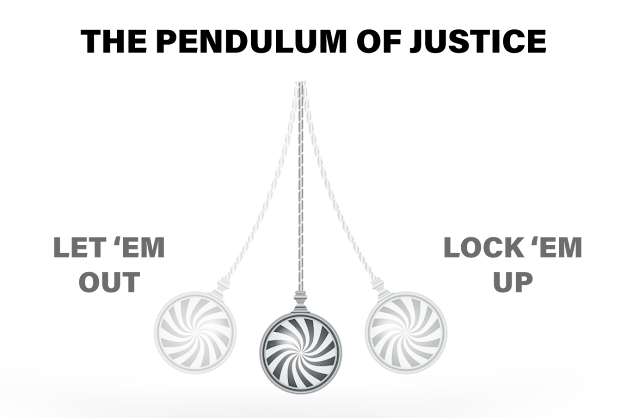The Pendulum of Justice: Let ‘em out, Lock ‘em up
Over the past decade we have witnessed a giant swing of the pendulum in the criminal justice system from tough on crime policies to soft on crime policies and back again. These erratic swings have been created by knee jerk reactions by legislators to fix what they refer to as problems and inequities in the criminal justice system. Unfortunately, these fixes have consistently failed, in fact, creating even larger imbalances that then need another fix which then also goes too far…and so on and so on. For example, for many years we heard cries from activist groups that “jails are overcrowded.” They claimed we had too many people in jail for low level crimes and the only reason they were there was because they could not afford a bail bond. This narrative became the fuel behind an entire criminal justice movement that most of us know as “bail reform”. The blame for overcrowding was put solely on people’s ability to pay bail. So, the reaction of legislators (and some DAs) was to release more people from jail for free or to engage in detention, thereby increasing jail populations and depriving accused individuals of Constitutional pre-trial release.
The problem with that narrative is that it is patently false. Bail is not the cause of jail overcrowding. No matter how much these reformers want to scapegoat and blame the bail industry for the ills of the criminal justice system, it just isn’t true. To really address the problem of jail overcrowding, one must understand why people are going to jail in the first place. It makes no sense to look at or even blame the bail industry, especially since bail is one of the most efficient and effective way to “release” defendants pretrial. We need to look at things like crime in general and why we have more people committing more crimes today then we have ever had previously? Why are people willing to break the law more today? And why are we willing as a society to excuse this behavior? Additionally, we need to look at the overall time it takes a single case to work its way through the system. The amount of time it takes for a case to move through the system has substantially increased over the past decade. Cases that used to take months now take years. Speedy justice is no longer speedy, and that has directly impacted the amount of time that people spend in the pretrial process. To say that bail causes people to stay in jail longer is just not true. An inefficient system that is overburdened by a substantial increase in crime is really what is to blame.
So why are people committing more crimes? Wouldn’t it be great if we could figure that out? Some people claim that is starts with the breakdown of the family structure. Some claim that it has to do with the recent decriminalization and bail reform movements that have eliminated all accountability in our criminal justice system. They say that people no longer fear punishment or arrest and are emboldened by this proliferation of soft on crime policies. Some people believe that the “defund the police” movement is to blame as it unleashed historic levels of crime and public disorder. And still others go all the way back to the Covid pandemic and blame the associated lockdowns and system closures for the crime we see today. I don’t know what specific cause is for everything that we are seeing today, but I can say with a high level of confidence, that it probably includes all of the above. All of the things I have mentioned have led to the proliferation of soft on crime policies around the country. And these policies had had the opposite effect of what was promised by the legislators that promoted them. They have resulted in extreme negative impacts on our communities and public safety. Our criminal justice system is no longer able to operate efficiently and effectively, and our communities are less safe. So much for progress.
To read more CLICK HERE.







Comments
Post a Comment